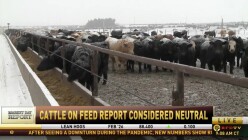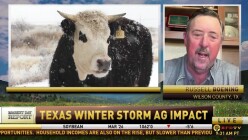Cattle
Mixed product pricing and rising milk supplies suggest margin management will remain critical as 2026 unfolds.
While row crops are expected to see softer impacts, analysts say severe weather of this magnitude will not be as kind to cattle producers.
Dairy farmer and Discover Ag co-host Tara Vander Dussen joined us to discuss the Whole Milk for Healthy Kids Act, her experience at the signing, and what’s next for her family and farm.
Analysts say a Supreme Court decision on tariffs could reshape protein markets, strain U.S.-China trade, and force farmers to rethink global demand strategies.
Wayne Cockrell with the Texas and Southwestern Cattle Raisers Association joined us to discuss preparedness, producer awareness, and the industry’s response to New World screwworm concerns.
Alan Bjerga with the National Milk Producers Federation joined us to review new policies and regulations supporting the dairy industry and what they mean for the year ahead.
Despite rising costs and growing food insecurity, meat demand remained strong in 2025 as higher-income consumers offset cutbacks elsewhere. Economists break down the K-shaped economy, upcoming USDA cattle reports, livestock production outlooks, and renewed debate over beef imports and country-of-origin labeling heading into 2026.
Livestock strength is carrying the farm economy, while crop margins remain tight and increasingly dependent on risk management and financial discipline.
Protein-driven dairy growth is boosting beef supply potential, creating an opening to support rural jobs and ground beef availability.
EXCLUSIVE: Texas Lawmakers Weigh USMCA’s Relevance and What Renegotiation Could Mean for Agriculture
RFD NEWS Correspondent Frank McCaffrey speaks with Texas’s Sen. Ted Cruz and Rep. Vicente Gonzalez about USMCA renegotiation and its impact on U.S.–Mexico agriculture trade.
The Midland County Junior Livestock Show in West Texas features a competitive steer showcase highlighting top-quality cattle and the accomplishments of driven youth exhibitors.
Congressman Dusty Johnson of South Dakota joined us to discuss key ag policy developments and his outlook for agriculture in 2026.
Tight beef cow supplies and steady demand point to continued record-level cull cow prices in 2026.
Expanded school access to whole milk provides modest but reliable demand support for U.S. dairy producers.
The American Farm Bureau Federation’s 2026 agenda centers on labor stability, biosecurity, and economic resilience for family farms. Expanded DMC coverage improves risk protection for dairy operations facing tighter margins.
A high-stakes legal case in a South Dakota federal court concerning misleading country-of-origin labeling (MCOOL), such as “Product of the USA,” on food products, will significantly impact U.S. agricultural policy for years to come.
Secretary Rollins also met with specialty crop producers at a local strawberry farm to discuss workforce needs and the Trump Administration’s recent wins related to significantly cutting the cost of H-2A labor for California farmers.
China’s beef policy risk stems from domestic volatility, making export demand inherently unstable. Jake Charleston with Specialty Risk Insurance offers his perspective on cattle markets, risk management, and producer sentiment.
Structural efficiency supports cattle prices and resilience — breaking it risks higher costs and greater volatility.
Strong pork demand and improving beef exports outside China support protein markets despite ongoing trade barriers.
The Farm Bureau’s honor highlights the important role farm dogs play on operations across the country, serving as dependable workers and trusted companions.
























